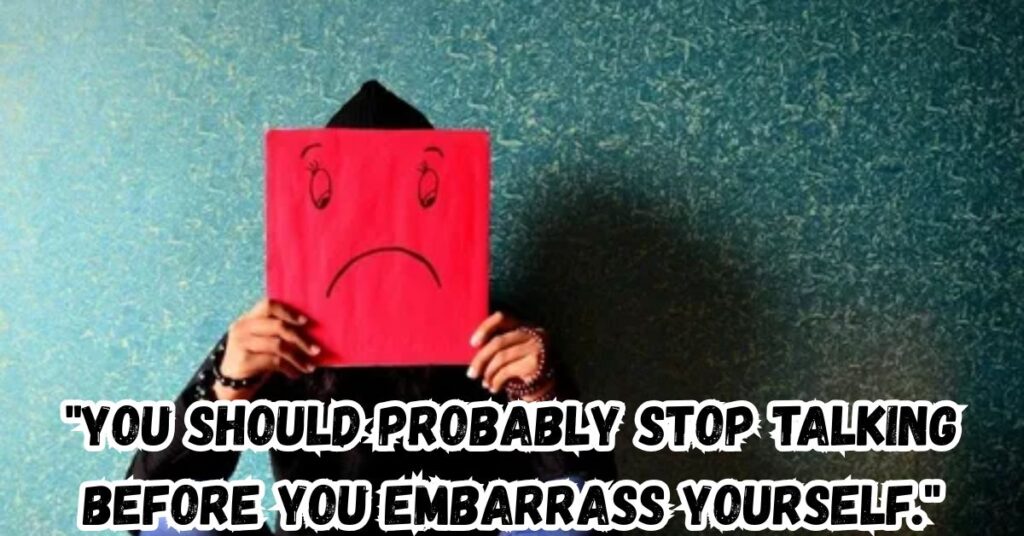We all face moments when someone says something inappropriate or rude. Having the perfect comeback ready can help you maintain your dignity while setting clear verbal boundaries. The right retort can immediately stop unwanted comments in their tracks.
Words have power. A well-timed response can effectively end an uncomfortable conversation. You don’t need to be mean to make your point. Sometimes the most clever replies are also the most composed.
Many people struggle to find the right words at the moment. This collection of witty comebacks will prepare you for those situations. You’ll never be caught speechless again.
Top 39+ Best Comebacks to Shut Someone Up
We’ve all been there caught in a conversation with someone who just won’t stop talking or keeps making inappropriate comments. Sometimes a perfect comeback is all you need to regain control of the situation.
These 39+ carefully crafted responses range from subtly witty to devastatingly direct, giving you options for any social scenario. Whether you’re dealing with a know-it-all coworker, an intrusive relative, or just someone who doesn’t understand boundaries, you’ll find the perfect verbal defense in this collection.
1. “I’m sorry, I didn’t realize you were an expert on my life.”
This works perfectly when someone offers opinions about your personal choices. The sarcastic tone makes your point without being overly aggressive. They’ll quickly realize they’ve overstepped.
2. “Does talking like that make you feel better?”
This question forces the other person to examine their behavior. It’s a subtle way to highlight their rudeness without escalating the situation. Often, they’ll become self-conscious about their approach.
3. “Oh, I didn’t know you had a degree in everything.”
Perfect for dealing with know-it-alls. This sharp response points out their presumption while maintaining a conversational tone. Most people will immediately recognize they’ve been too forward.
4. “It must be exhausting, knowing everything about everything.”

Similar to the previous comeback, but with a touch more sympathy. The false concern highlights their arrogance. This approach works well in professional settings where outright confrontation isn’t appropriate.
5. “Wow, I didn’t ask for your opinion, but thanks for sharing.”
Direct yet polite, this response clearly establishes that their input wasn’t requested. The thanking at the end softens the blow while still making your point about unwanted opinions.
6. “I’ll consider that when I’m taking advice from someone I respect.”
This comeback establishes boundaries immediately. It makes clear that you don’t value their input without directly insulting them. The implication is powerful.
7. “I’ve heard worse from better people.”
Short and effective, this dismissive response minimizes both their comment and their importance. It suggests they aren’t worth getting upset about.
8. “Are you done, or is there more to your little speech?”
This question reclaims control of the conversation management. The word “little” diminishes the importance of what they’re saying. They’ll likely stop talking immediately.
READ MORE BLOG : Friendship Quotes for Long Distance Best Friends
9. “I’d agree with you, but then we’d both be wrong.”
A classic comeback that points out the flaws in their reasoning. This works especially well when someone is clearly incorrect but won’t back down.
10. “Please, keep talking. I always yawn when I’m interested.”

The sarcasm is unmistakable. This response makes it clear you find their comments boring and unnecessary. Most people will stop talking rather than continue being mocked.
11. “That’s cute, but nobody cares.”
Sometimes directness is required. This dismissive response works when subtlety has failed. It’s particularly effective against persistent comments.
12. “You sound better when you’re quiet.”
Simple and impossible to misinterpret. This comeback directly suggests they stop talking without room for argument.
13. “You have the right to remain silent. Please exercise it.”
A playful reference to legal warnings that makes your point clearly. The humor softens the request while still effectively shutting down unwanted conversation.
14. “Thanks for your input, it’s been filed under ‘not necessary.'”
Office humor that works well in many situations. It acknowledges they spoke while making clear you won’t be considering their comments.
15. “Your opinion is like a broken pencil pointless.”
This metaphor delivers a clear message about the value of their input. The imagery makes this comeback memorable and effective for verbal defense.
16. “I’m sure you’ll find someone who cares, eventually.”
This suggests they should take their comments elsewhere. The “eventually” implies it might be a long search, adding an extra sting.
17. “You should probably stop talking before you embarrass yourself.”

This comeback appears helpful while actually delivering criticism. It suggests they’re making a fool of themselves without directly saying so.
18. “Funny how people with no clue always have the most to say.”
This observation about human nature indirectly criticizes them. It’s a good option for social dialogue where direct confrontation might be inappropriate.
READ MORE BLOG : Flirty “How Was Your Day?” Texts to Send to a Guy
19. “I’ll let you know when I start caring.”
Simple and direct, this makes clear that their opinion holds no value to you. The future tense implies that moment may never come.
20. “That was a great story, but too bad nobody asked for it.”
False praise followed by criticism creates a powerful verbal counter. This works well against those who dominate conversations with irrelevant stories.
How To Deliver Comebacks Effectively
The delivery matters as much as the words. Maintain eye contact when delivering your retort. Your body language should remain calm and controlled.
Timing is crucial for effective responses. Wait for a natural pause rather than interrupting. This shows you’re in control of your reactions.
Match your tone to the situation. Sometimes a lighthearted delivery works better than aggression. Consider your environment before choosing your approach to conversation control.
The Psychology Behind Good Comebacks
Effective comebacks create cognitive dissonance. They force the other person to reconsider their approach. This psychological technique is central to successful deflection techniques.

Great retorts often use the other person’s energy against them. Like verbal aikido, they redirect the force of unwanted comments back to their source.
The best comebacks make people self-reflect. When someone realizes they’ve overstepped, they’ll often correct their own behavior without further confrontation.
Frequently Asked Questions
When should I use these comebacks?
Use them when someone crosses your personal boundaries with rude comments or unwanted advice. Choose the right one based on how aggressive the situation feels.
Will these comebacks work in professional settings?
Some will, but stick to the milder ones at work. The sarcastic but polite options can help maintain professional relationships while still setting boundaries.
How can I remember these at the moment?
Practice your favorites until they become second nature. Having just 3-5 ready to go is better than trying to memorize all 39.
What if the person gets angry after my comeback?
Stay calm and don’t escalate. If they become hostile, simply walk away – you’ve already made your point.
Is it better to just walk away sometimes?
Absolutely. The strongest response can be showing someone they’re not worth your time or energy. Not every comment deserves a response.
Conclusion
Having a repertoire of smart responses empowers you in difficult conversations. These comebacks help you maintain control without resorting to rudeness or aggression.
The key to effective verbal boundaries is confidence. Deliver your chosen comeback clearly and directly. Then move on without dwelling on the interaction.
Remember that the goal isn’t to hurt feelings but to protect your peace. The perfect comeback ends unwanted conversation without starting a conflict. It allows you to maintain your dignity while clearly communicating your boundaries.

Bolt is a seasoned SEO expert with a passion for content writing, keyword research, and web development. He combines technical expertise with creative strategies to deliver exceptional digital solutions.















